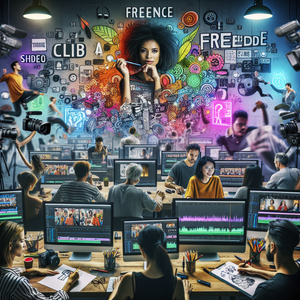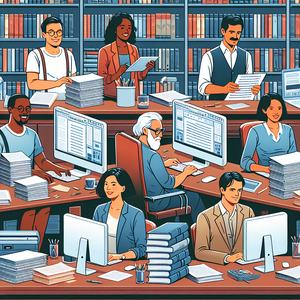
15 Exciting Career Opportunities for Aspiring Freelance Editors: Navigating a Diverse Landscape
Diving into the world of freelance editing opens a treasure trove of career possibilities, perfect for those looking to merge creativity with flexibility in the literary and publishing arenas. From refining manuscripts to polishing online content, aspiring editors can find a niche that aligns with their passions and strengths. It's important to evaluate your personal skills, curate an impressive portfolio, and hone your editing style to stand out in this vibrant marketplace. Although formal education can be advantageous, it is not mandatory, making the field accessible to a broad range of talent. Understanding your specific interests—whether in academic editing, copyediting, or video editing—can significantly influence your success. If you love language and storytelling, the freelance editing profession offers a wealth of rewarding opportunities. Let’s explore 15 essential roles in freelance editing, each bringing unique insights and prospects.
Job Summaries:
Freelance Editor:
- Freelance editors enhance written content across diverse formats, including books, articles, and web material.
- Their work involves line editing, copyediting, and proofreading to bolster clarity and coherence.
- A successful freelance editor has a sharp eye for detail and excellent communication skills.
- While a degree in English can help, many editors thrive through experience and a strong portfolio, enjoying the freedom to choose projects that inspire them.
Copy Editor:
- Copy editors refine written works for publication, correcting grammar, punctuation, and stylistic inconsistencies.
- They partner closely with authors, ensuring that content resonates with readers and adheres to publisher standards.
- A robust command of language and familiarity with editorial style guides are imperative.
- Many copy editors possess degrees in English or journalism, complemented by prior writing or editing experience, which is vital for producing polished drafts.
Proofreader:
- Proofreaders serve as the final checkpoint in the publishing process.
- Identifying typographical errors, formatting issues, and style discrepancies.
- Acute attention to detail is essential.
- Proofreaders often navigate tight deadlines to ensure timely publication.
- Formal education is not always necessary.
- Strong grammar skills and a solid grasp of the publishing process are key.
- This role is ideal for those who excel at meticulous tasks that enhance publication quality.
Developmental Editor:
- Developmental editors work with manuscripts in their formative stages.
- They offer thorough feedback on structure, character development, and narrative flow.
- Their goal is to help authors craft compelling stories.
- Exceptional communication skills are crucial for developmental editors.
- A deep appreciation for storytelling is also important.
- Many developmental editors come from backgrounds in creative writing or literature.
- Collaboration with authors is particularly fulfilling for them.
Content Editor:
- Content editors oversee the quality of text for websites, blogs, and social media.
- Ensuring alignment with brand voice and audience engagement.
- A background in digital marketing or communications can be advantageous.
- Familiarity with SEO best practices is important.
- Strong organizational abilities are necessary for juggling multiple projects.
- This role is essential in the competitive digital landscape.
Academic Editor:
- Academic editors focus on scholarly articles, theses, and dissertations, guaranteeing adherence to strict academic standards.
- They work with researchers and students to enhance clarity, coherence, and proper formatting.
- A graduate degree in a relevant field is often preferred, along with experience in academic writing and editing.
- This role is instrumental in helping scholars communicate their research effectively for publication.
Book Editor:
- Book editors oversee the editing process for manuscripts, guiding authors from initial drafts to publication.
- They provide feedback on content, structure, and pacing while coordinating with copy editors and proofreaders.
- A background in publishing and strong project management skills are crucial.
- Enabling book editors to shape the literary landscape by helping authors realize their visions.
Video Editor:
- Video editors compile recorded footage into cohesive final products.
- They often work on promotional videos, documentaries, or online content.
- Proficiency in video editing software is essential.
- A strong sense of pacing, storytelling, and visual composition is important.
- Creativity and meticulousness are vital for success in this field.
- The field is rapidly expanding with opportunities across various platforms.
- Opportunities include social media and streaming services.
Social Media Editor:
- Social media editors develop and curate content for social media channels.
- Ensuring posts are engaging and aligned with brand messaging.
- They track audience engagement and adapt strategies accordingly.
- Making this role dynamic and ever-changing.
- Strong writing skills are crucial.
- Familiarity with social media trends is important.
- A creative mindset is essential.
- Ideal for those who thrive at the intersection of content creation and digital marketing.
Technical Editor:
- Technical editors focus on specialized documents, such as manuals, reports, and scientific papers.
- They ensure clarity and accuracy to translate complex information into accessible content.
- A background in a technical field, such as engineering or computer science, is often beneficial.
- Strong editing skills are important for this role.
- This role is vital for producing clear documentation that meets industry standards.
Marketing Editor:
- Marketing editors create and refine promotional content.
- Collaborating closely with marketing teams to craft campaigns and materials that maintain branding consistency.
- Strong writing and analytical skills are essential.
- Understanding market trends can significantly enhance campaign effectiveness.
- This role is pivotal in driving sales and increasing brand visibility.
Substantive Editor:
- Substantive editors offer comprehensive editing services, focusing on overall content structure and coherence.
- They work with authors to improve clarity, flow, and readability, often rewriting sections to enhance manuscripts significantly.
- A deep understanding of narrative techniques and excellent communication skills are essential.
- Substantive editors play a crucial role in transforming rough drafts into polished works.
Online Editor:
- Online editors manage digital content for websites and online publications.
- They ensure articles are optimized for web engagement.
- They oversee the editing process from draft to publication.
- They collaborate with writers and other editors.
- Familiarity with content management systems and SEO principles is critical.
- This role is essential for maintaining a robust online presence.
Freelance Writer-Editor:
- Freelance writer-editors combine writing and editing skills, often working on a project basis for various clients.
- They generate original content and offer editing services to refine existing materials.
- Strong writing and editing abilities are required, along with the capacity to manage multiple projects.
- This role provides flexibility and the chance to engage in diverse tasks.
Editorial Assistant:
- Editorial assistants support editors and publishing teams by performing tasks such as proofreading, fact-checking, and administrative duties.
- This entry-level position serves as an excellent starting point for those looking to gain experience in publishing.
- Strong organizational skills and meticulous attention to detail are essential, along with a passion for literature.
- This role is a valuable stepping stone toward advanced editing positions.
The freelance editing landscape offers a myriad of career paths for those seeking fulfilling work. By understanding the specific requirements and responsibilities of each role, aspiring editors can navigate their paths more effectively and align their skills with market needs. Whether drawn to the structured realm of academic editing or the dynamic world of digital content, numerous opportunities await exploration. Continuously updating your skills and staying informed about industry trends will further enhance your prospects in this exciting and ever-evolving profession.
Explore More Jobs

